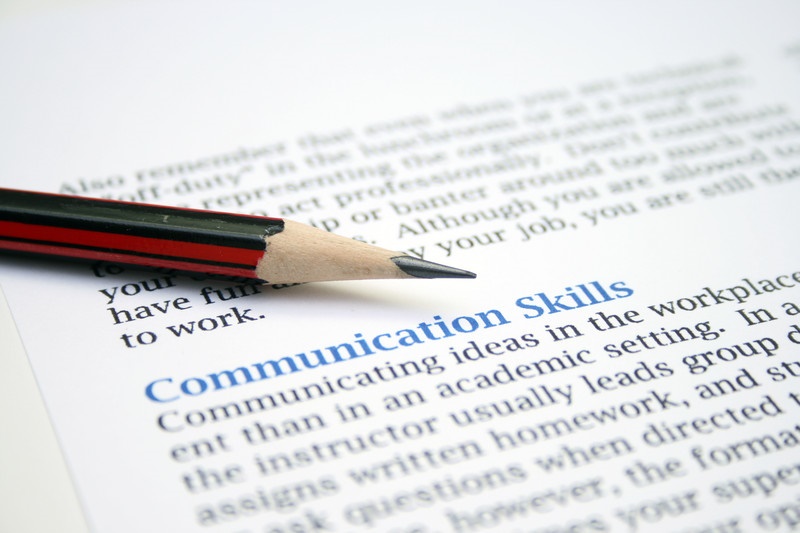
Communication is regularly cited as one of the most—if not the most—crucial factors to strengthening and sustaining healthy relationships. As reported by the PBS program The Emotional Life:
“How couples behave when solving problems together or arguing can predict the character and success of their relationship. A raised eyebrow, a hand on the arm, or a greeting all may seem like small things, but research shows that the quality of everyday interactions can make or break a relationship.”
Similarly, communication skills are just as important at work: one 2014 survey of nearly 600 employers found that communication skills are the most in-demand skill set among employers. In fact, of five major skill sets employers consider most valuable when making a hiring decision, communications skills top the list.
From sustaining healthy relationships to getting hired to being promoted, communication affects nearly every part of our lives. Striving to improve our communication skills, then, is not a bad place to start if we wish to make some positive improvements.
How to Become an Effective Communicator
Becoming an effective communicator is not terribly complicated, but it will call for some basic skills and the motivation to practice.
Step one is to acknowledge that the objective of any communication situation is an honest, open-ended exchange of information where all individuals can be heard and understood. This requires assertive and articulate speaking abilities, but, just as significantly, requires robust listening skills.
In truth, listening skills may be the most significant component of communication. The reason is very simple: if you fail to understand what is being said, you won’t have the ability to articulate a relevant and significant reply. This lack of ability to understand is the root cause of countless misunderstandings, quarrels, and bad feelings.
Improving listening skills, then, is the single most important thing you can do to become a better communicator. And while active listening is often challenging on its own, hearing loss will make things even trickier.
Hearing Loss and the Barriers to Active Listening
Active listening calls for devoting all attention to the speaker. Only by totally understanding the communication can you create a relevant and substantial reply, and that’s why ineffective speakers are nearly always preoccupied listeners.
But what produces the distraction?
Here are four typical sources of distraction and how hearing loss has a tendency to make things even worse:
Distraction # 1: Stress
If you’ve ever been overly stressed or anxious, you recognize how challenging it can be to concentrate. You’re more liable to be focused on your personal thoughts and feelings rather than on the speaker’s, and you’re likely to lose out on essential non-verbal signs and to misinterpret what others are saying.
Regarding stress, hearing loss by itself is a significant source. You may feel anxious about missing out on important information or coming up with awkward responses. And, the struggle to hear speech in the existence of hearing loss is a source of anxiety and strain itself.
Distraction # 2: Lack of focus
Active listening is challenging because our minds have the normal inclination to wander. You can’t simultaneously listen to the speaker and daydream, read your email, text, and plan what you’re going to say next. Staying within the present moment and concentrating on the speaker is the only method to pick up on the subtle details of the speaker’s message.
Hearing loss brings about a lack of focus because it takes you out of the present moment. If you’re working to figure out what the speaker just said, you’re also losing out on what they’re saying at the moment. The continuous catching-up virtually ensures that you’ll never properly understand the message.
Distraction # 3: Misunderstanding
Stress and lack of focus can both lead you to misinterpret the message. This presents the possibility of you becoming upset or agitated with a message that the other person never actually intended to send.
This at minimum wastes time and at worst produces bad feelings. Not to mention the irritation of the individual who is consistently misunderstood.
Distraction # 4: Lack of confidence
If you lack confidence, you’ll find it very difficult to assert yourself while interacting. You’ll probably also be preoccupied with what the other person thinks rather than on the content of what they’re saying.
Hearing loss makes things worse, as you can imagine, because your misinterpretations could be thought of as a sign that you just don’t understand the message. If you’re continuously requesting clarification on simplistic points, it makes it difficult to feel confident enough to be assertive.
How Hearing Aids can Help
Becoming a better communicator necessitates becoming a better listener, but how can you become a better listener if you have hearing loss? You have several choices, but because hearing aids have come so far in terms of identifying and amplifying speech, they actually are the ideal solution.
Contemporary digital hearing aids have a number of wonderful features made exclusively for speech recognition. Many hearing aid models come with background noise suppression, directional microphones, and innovative digital processing so that speech comes through loud and clear.
Without having to strain to hear speech, you can focus all of your efforts on comprehending the message. Then, as you become a more effective active-listener, your confidence, assertiveness, and speaking skills will all take care of themselves.
If you have hearing loss and you’re ready to start building distraction-free listening skills, schedule your hearing test today.